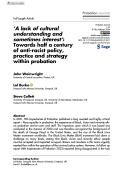By Stephen Koppel, Michael Rempel, Min Xie, Olive Lu, Jeremy Travis, & Preeti Chauhan
Executive Summary The premise of this project is simple: In determining its response to crime and violence, New York City stands at a crossroads. For several decades up until the 2020s, the City saw dramatic crime reductions take place alongside a shrinking criminal legal system— represented by fewer arrests, less reliance on jail and prison, and the expansion of alternatives to incarceration. This period culminated in sweeping reforms to New York State’s bail, discovery, and parole laws that sought to extend the pendulum toward less unnecessary incarceration and greater fairness. Recent years, however, have witnessed a series of dislocations and reversals. A global pandemic disrupted the country’s social and economic fabric, and violent crime increased after years of decline. The 2020 Black Lives Matter protests generated a robust public dialogue about the role of police and the criminal justice system in producing public safety and the need for greater investments in community-based public safety strategies. However, both the reality and perception of rising crime led to increases in low-level enforcement by the New York City Police Department, including more pedestrian street stops, summonses for minor misconduct, and misdemeanor arrests. At the same time, the City is legally mandated to close the violent and decrepit jails on Rikers Island. This requires further reductions in the jail population, for example by expanding mental health services and speeding up case processing, in addition to improving morale, training and oversight of jail staff and expediting construction of modern, humane replacement jails. To provide context for discussions on the best path forward, we sought to ground policy discussions in objective data concerning the City’s trajectory from the 1990s to the present moment. To this end, we released two reports on the same project landing page. Extending two earlier analyses, one report relied on official data sources to track crime, law enforcement activity, decision-making by courts and prosecutors, incarceration, community supervision, and racial disparities. The second report relied on data from the annually administered National Crime Victimization Survey (NCVS) to provide trends in both reported and unreported victimization. This executive summary presents key findings from both reports. We believe that understanding New York City's crime trends, the experiences of crime victims, and the history of the City's response to crime will shed light on the choices the City faces today. We address several questions, with the resulting main themes and findings summarized below
New York: Data Collaborative for Justice, at John Jay College, 2025. 4p





